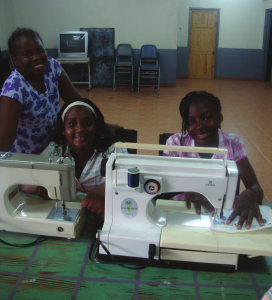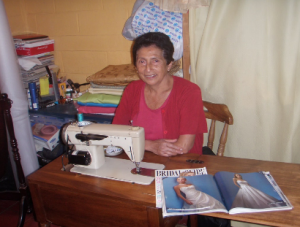by Patricia Hamill
Fall 2016 InGear
Adaptability, resilience and initiative. These are the key factors that define success in the world of the NGO and that are the very foundation of Pedals for Progress (P4P), a small, but internationally active nonprofit. Founded in 1991 by David this undertaking was not intended to be part of a charity effort, but a leg up for the economically disadvantaged. Over the last 25 years, P4P has searched out communities in the developing world and connected them with access to employment and self-sufficiency by providing them with sewing machines, bicycles and maintenance parts.
To date, more than 145,000 bicycles and 3,200 sewing machines have been shipped to P4P’s nonprofit partners in more than 40 countries including Nicaragua, Guatemala, Ghana, Albania, and Fiji, and the numbers continue to grow as collections are scheduled year round. The partners in these countries arrange the pick up and delivery of the shipments, and they often serve as an ongoing center of support and education for those who purchase the bikes and sewing machines.
It is important to our philosophy of self-empowerment that people maintain a sense of self-reliance and initiative. Recipients of the bicycles and sewing machines that P4P collects and ships are required to purchase them. While the amount may be minimal, we feel that paying for affordable and low-maintenance access to employment offers a long-term solution to poverty. The recipients can earn their own way and take pride in their improved lifestyles. But what are the challenges of such an undertaking? When dealing with the bicycles, there are large containers to ship, customs to navigate, delivery to arrange at the recipients’ location and reliable partners to connect with so that this endeavor remains untouched by mismanagement. These obstacles are among the reasons why P4P is now expanding its focus and putting sewing machines at the front of the list of shipping priorities.
 Our sewing machine collections are under the auspices of Sewing Peace—still a part of P4P, but independent all the same. The shipping itself is less expensive and that enables Sewing Peace to allocate more funds towards outreach: We can stack the sewing machines on pallets and transport them in smaller vehicles once at their destination. Usually 20 or 30 machines are enough to fully supply a co-op or school without our needing to resupply. Sewing machines are practical because they are also technologically appropriate to the locations where they are distributed.
Our sewing machine collections are under the auspices of Sewing Peace—still a part of P4P, but independent all the same. The shipping itself is less expensive and that enables Sewing Peace to allocate more funds towards outreach: We can stack the sewing machines on pallets and transport them in smaller vehicles once at their destination. Usually 20 or 30 machines are enough to fully supply a co-op or school without our needing to resupply. Sewing machines are practical because they are also technologically appropriate to the locations where they are distributed.
There are several success stories from long-term and new partnerships formed over the years. One such fortuitous relationship is with the Foundation for the Environment and Sustainable Development (FIDESMA). Located in Guatemala, this organization runs economic development programs that enable locals to learn a variety of skills such as computer use and more efficient methods of agriculture. FIDESMA is able to make use of the bicycles and sewing machines in two ways. First, those who purchase these enhance their earning power by accessing employment in more remote areas or by setting up their own sewing businesses right in their own homes. Then the income from the sales enables FIDESMA to continue to fund its programs and keep the classes running. This system of reciprocity is much more desirable than the cycle of poverty that exists so pervasively in this region.
The Barrouallie Secondary School on the island of St. Vincent is the fortunate institution that welcomed a dedicated Peace Corps Volunteer who was familiar with P4P’s work. She arranged for 20 sewing machines to add to the school’s vocational curriculum. These particular machines are strictly for educational purposes rather than commercial, but the skills these Vincentian students take away with them will help them avoid work in banana production and the insecurity that comes with crop diseases and other negative effects on prices. Tourism is a growing industry on the island, but there are only so many jobs to go around. The sewing machines do not rely on seasons or market values to function reliably.
 As bicycle donations dwindle in the face of a reduction in consumer spending and an increase in their value as scrap metal, it has become immensely important that P4P maintain its momentum and continue its mission uninterrupted. What Sewing Peace hopes to accomplish, in the spirit of P4P, is to connect with many more people who can provide and store unwanted sewing machines domestically and may have ideas and suggestions as to where Sewing Peace can expand their footprint in the world.
As bicycle donations dwindle in the face of a reduction in consumer spending and an increase in their value as scrap metal, it has become immensely important that P4P maintain its momentum and continue its mission uninterrupted. What Sewing Peace hopes to accomplish, in the spirit of P4P, is to connect with many more people who can provide and store unwanted sewing machines domestically and may have ideas and suggestions as to where Sewing Peace can expand their footprint in the world.
Making changes after 25 successful years can be difficult for some, but P4P was founded on challenge and filling a need. Pedals for Progress and Sewing Peace embrace the evolution that must happen to keep the spirit of economic stability alive. The needs of the poor stay the same but how they are met must evolve and this NGO is not losing any momentum shifting gears and running smoothly ahead. As the saying goes, “A rising tide lifts all boats.”
[Patricia Hamill, M.A., is the founder of Heron Moon Press and an adjunct faculty member at Pace University and Southern New Hampshire University specializing in Composition Studies. She is a freelance writer and editor who regularly contributes to “InGear,” the newsletter of Pedals for Progress. Her blog on writing and mindful living can be found at HeronMoon.com.]
